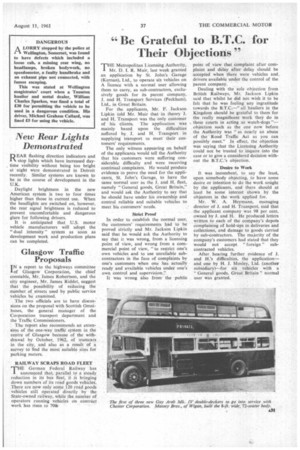"Be Grateful to B.T.C. for Their Objections"
Page 33

If you've noticed an error in this article please click here to report it so we can fix it.
THE Metropolitan Licensing Authority,
Mr. D. I. R. Muir, last week granted an application by St. John's Garage (Kernan), Ltd., to operate six vehicles on A licence with a normal user allowing them to carry, as sub-contractors, exclusively goods for its parent company, J. and H. Transport Services (Peckham), Ltd., in Great Britain.
For the applicants, Mr. F. Jackson Lipkin told Mr. Muir that in theory 1. and H, Transport was the only customer of his clients. The application was mainly based upon the difficulties suffered by J. and H. Transport in supplying transport to meet their customers' requirements,
The only witness appearing on behalf of the applicants would tell the Authority that his customers were suffering considerable difficulty and were receiving continual complaints. He would produce evidence to prove the need for the applicants, St. John's Garage, to have the same normal user as the J. and H. fleet, namely "General goods, Great Britain," and would ask the Authority to say that he should have under his ownership and control reliable and suitable vehicles to meet his customers' needs.
Strict Proof
In order to establish the normal user, the customers' requirements had to be proved strictly and Mr. Jackson Lipkin said that he would ask the Authority to say that it was wrong, from a licensing point of view, and wrong from a commercial point of view, "to restrict one's own vehicles and to use unreliable subcontractors in the face of complaints by one's customers when one has actually ready and available vehicles under one's own control and supervision."
It was wrong also from the public point of view that complaint after complaint and delay after delay should be accepted when there were vehicles and, drivers available under the control of the parent company.
Dealing with the sole objection from British Railways, Mr. Jackson Lipkin said that whilst he did not wish it to be felt that he was feeling any ingratitude towards the B.T.C.—" all hauliers in the Kingdom should be grateful to them for the really magnificent work they do in these courts in acting as watch-dogs "objection such as the one now before the Authority was "as nearly an abuse of the Road Traffic Act as you can possibly meet." In effect, the objection was saying that the Licensing Authority could not be trusted to inquire into the case or to give a considered decision without the B.T.C.'s objection.
Desire to Work
it was incumbent, to say the least, upon somebody objecting, to have some desire or intention to do the work sought by the applicants, and there should at least be some interest shown by the objectors in the work applied for.
Mr. W. A. Heymann, managing director of J. and H. Transport, said that the applicant company was 98 per cent. owned by J. and H. He produced letters written to each of the company's depots complaining of hold-tips in deliveries and collections, and damage to goods carried by sub-contractors. The majority of the company's customers had stated that they would not accept " foreign " subcontracted vehicles.
After hearing further evidence of J. and H.'s difficulties, the application— and one by H. J. Mosley, Ltd. (another subsidiary)—for six vehicles with a " General' goods, Great Britain" normal user was granted.




















































































































